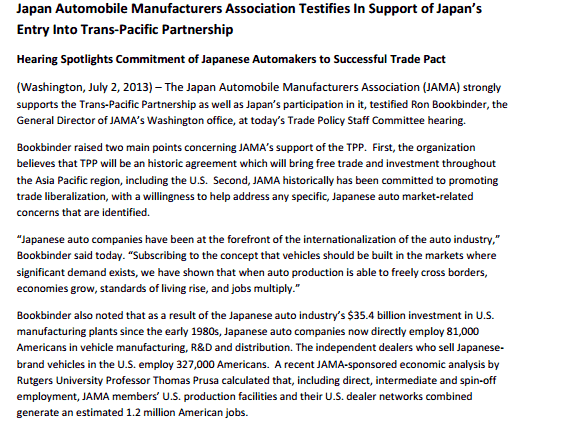Hearing Spotlights Commitment of Japanese Automakers to Successful Trade Pact
(Washington, July 2, 2013) – The Japan Automobile Manufacturers Association (JAMA) strongly supports the Trans-Pacific Partnership as well as Japan’s participation in it, testified Ron Bookbinder, the General Director of JAMA’s Washington office, at today’s Trade Policy Staff Committee hearing.
Bookbinder raised two main points concerning JAMA’s support of the TPP. First, the organization believes that TPP will be an historic agreement which will bring free trade and investment throughout the Asia Pacific region, including the U.S. Second, JAMA historically has been committed to promoting trade liberalization, with a willingness to help address any specific, Japanese auto market-related concerns that are identified.
“Japanese auto companies have been at the forefront of the internationalization of the auto industry,” Bookbinder said today. “Subscribing to the concept that vehicles should be built in the markets where significant demand exists, we have shown that when auto production is able to freely cross borders, economies grow, standards of living rise, and jobs multiply.”
Bookbinder also noted that as a result of the Japanese auto industry’s $35.4 billion investment in U.S. manufacturing plants since the early 1980s, Japanese auto companies now directly employ 81,000 Americans in vehicle manufacturing, R&D and distribution. The independent dealers who sell Japanese- brand vehicles in the U.S. employ 327,000 Americans. A recent JAMA-sponsored economic analysis by Rutgers University Professor Thomas Prusa calculated that, including direct, intermediate and spin-off employment, JAMA members’ U.S. production facilities and their U.S. dealer networks combined generate an estimated 1.2 million American jobs.
“JAMA reiterates our historic willingness and support in addressing any specific, Japanese auto market-related concerns that are identified,” Bookbinder said. “Since the first interaction between our two countries on auto trade in the 1980s, through the MOSS and Framework negotiations, JAMA has sought to be a positive force by organizing, or helping to organize, business seminars, including one-on-one meetings between the Japanese auto companies and U.S. auto parts companies, and by engaging in continuous, constructive dialogue at the industry trade association level. We look forward to continuing this positive role.”
To view the text of JAMA’s testimony, go to: www.jama.org/pdf/JAMA_testimony_2013_07_02.pdf
Learn more about the Japanese auto industry in the U.S. atwww.jama.org.
Press Contact
Art Swift
202-803-6828
Click to view PDF


